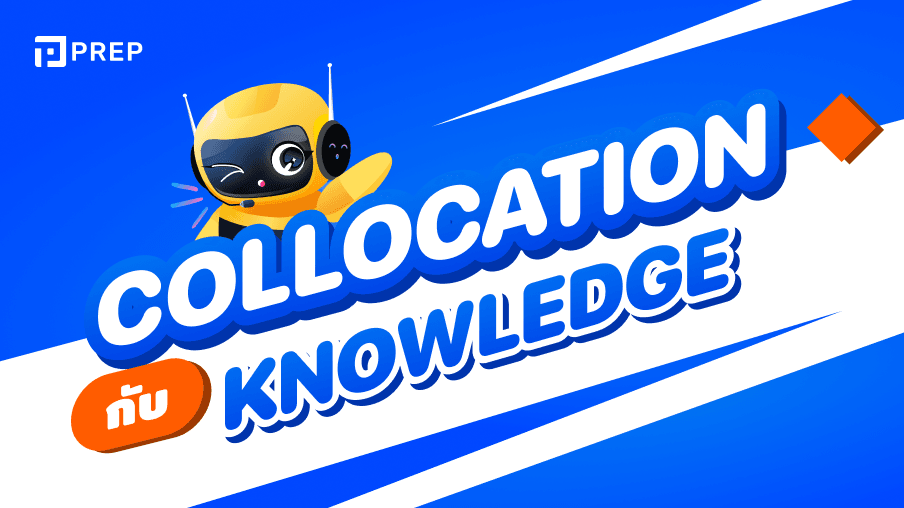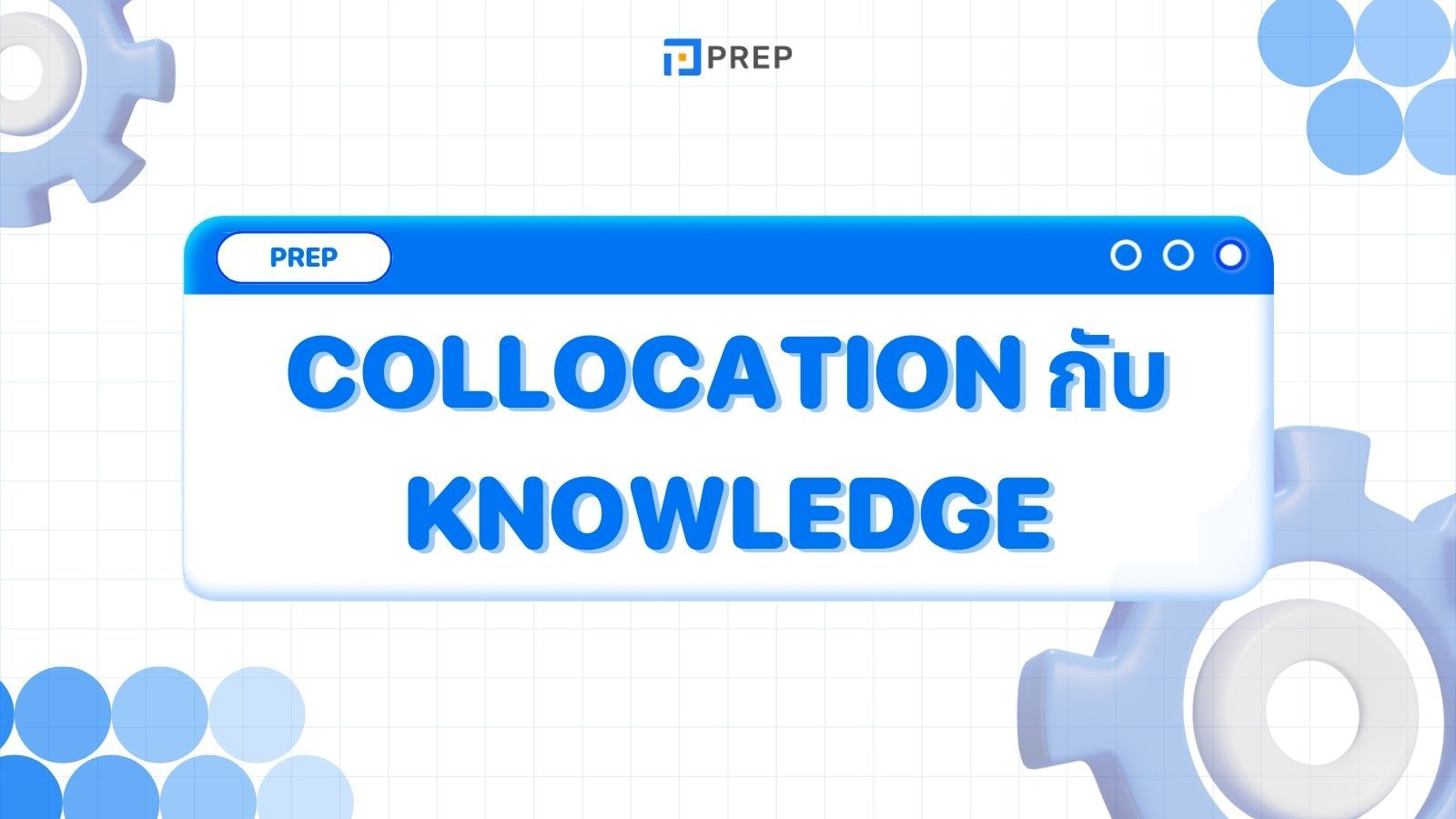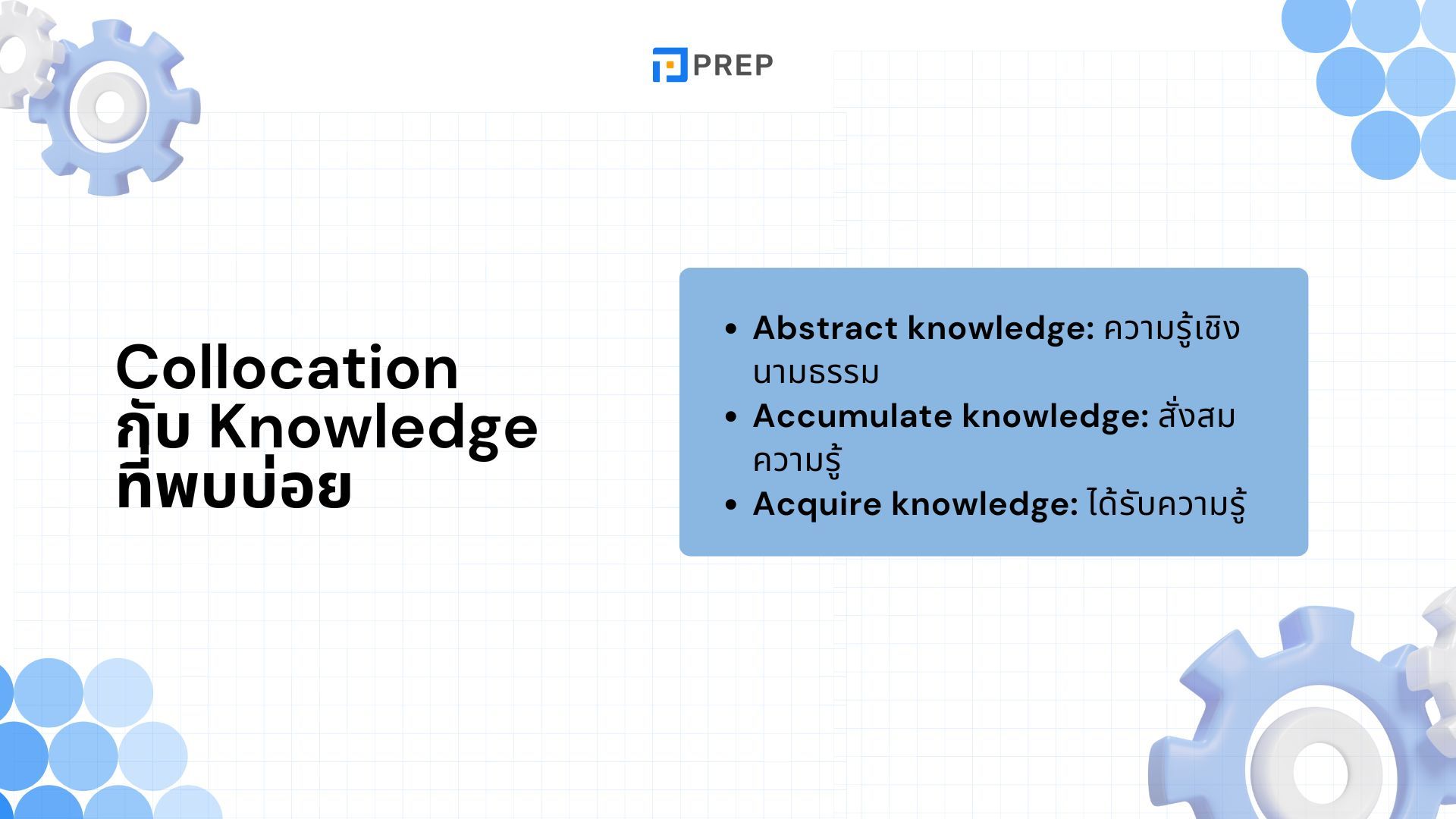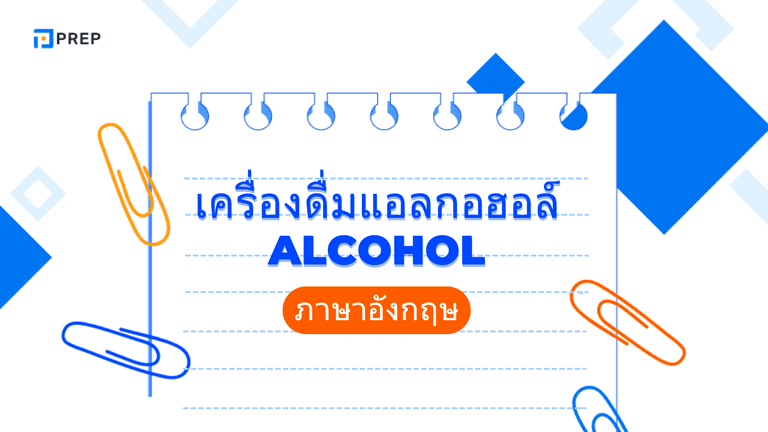รวม 50+ Collocation กับ Knowledge ที่พบบ่อยที่สุด
Knowledge เป็นคำที่พบบ่อยในภาษาอังกฤษ ซึ่งมักปรากฏทั้งในการสนทนาประจำวันและในงานเขียนทางวิชาการ อย่างไรก็ตาม แทนที่จะใช้คำว่า Knowledge เฉยๆ หลายคนมักผสมกับคำอื่นๆ เพื่อสร้าง Collocations ที่มีคุณภาพ มาสำรวจ 50+ Collocation กับ Knowledge ที่พบบ่อยที่สุดกันที่นี่กับ PREP กันเลย!

I. Knowledge คืออะไร
Knowledge ออกเสียงว่า /ˈnɑː.lɪdʒ/ และทำหน้าที่เป็นคำนาม มีความหมาย: ข้อเท็จจริง ข้อมูล และทักษะที่ได้รับโดยบุคคลผ่านประสบการณ์หรือการศึกษา ความเข้าใจทฤษฎีหรือปฏิบัติเกี่ยวกับหัวข้อนั้น เช่น:
- Anna's knowledge of English grammar is very extensive. (ความรู้ของ Anna เกี่ยวกับไวยากรณ์ภาษาอังกฤษกว้างขวางมาก)
- Jack has a limited knowledge of French. (Jack มีความรู้เกี่ยวกับภาษาฝรั่งเศสอย่างจำกัด)

II. รวม Collocation กับ Knowledge ที่พบบ่อย
เพื่อช่วยให้คุณเรียนรู้ Collocation กับ Knowledge ได้อย่างมีประสิทธิภาพและง่ายดาย PREP ได้รวบรวม 50+ Collocation กับ Knowledge ที่พบบ่อย พร้อมความหมายและตัวอย่างเฉพาะ ตรวจสอบเลย!
|
No. |
Collocation กับ Knowledge |
ตัวอย่าง |
|
1 |
Abstract knowledge /ˈæbstrækt ˈnɒlɪdʒ/ ความรู้เชิงนามธรรม |
Philosophers often ponder abstract knowledge beyond the realm of tangible reality. (นักปรัชญามักครุ่นคิดเกี่ยวกับความรู้ที่เป็นนามธรรมเกินกว่าขอบเขตของความจริงที่จับต้องได้) |
|
2 |
Accumulate knowledge /əˈkjuːmjʊleɪtɪd ˈnɒlɪdʒ/ สั่งสมความรู้ |
Through years of study and practice, she has accumulated knowledge in her field. (ผ่านปีของการศึกษาและการปฏิบัติ หล่อนได้สะสมความรู้ในสาขาของเธอ) |
|
3 |
Accurate knowledge /ˈækjʊrɪt ˈnɒlɪdʒ/ ความรู้ที่ถูกต้องแม่นยำ |
It's essential to ensure that the information you have is accurate knowledge. (มันเป็นสิ่งจำเป็นที่จะต้องแน่ใจว่าข้อมูลที่คุณมีคือความรู้ที่ถูกต้อง) |
|
4 |
Acquire knowledge /əˈkwaɪəd ˈnɒlɪdʒ/ ได้รับความรู้ |
Learning from various sources helps in acquiring knowledge on diverse topics. (การเรียนรู้จากแหล่งต่างๆ ช่วยในการได้รับความรู้ในหัวข้อที่หลากหลาย) |
|
5 |
Adequate knowledge /ˈædɪkwət ˈnɒlɪdʒ/ ความรู้ที่เพียงพอ |
Adequate knowledge of the subject is necessary to tackle complex problems. (ความรู้ที่เพียงพอเกี่ยวกับหัวข้อเป็นสิ่งจำเป็นในการจัดการกับปัญหาที่ซับซ้อน) |
|
6 |
Applied knowledge /əˈplaɪd ˈnɒlɪdʒ/ ความรู้เชิงประยุกต์ |
Applied knowledge is what sets experts apart from novices in any field. (ความรู้ที่ประยุกต์ใช้คือสิ่งที่ทำให้ผู้เชี่ยวชาญแตกต่างจากมือใหม่ในทุกสาขา) |
|
7 |
Basic knowledge /ˈbeɪsɪk ˈnɒlɪdʒ/ ความรู้พื้นฐาน |
Building a strong foundation of basic knowledge is crucial for advanced learning. (การสร้างรากฐานของความรู้พื้นฐานที่แข็งแกร่งเป็นสิ่งสำคัญสำหรับการเรียนรู้ขั้นสูง) |
|
8 |
Collective knowledge /kəˈlɛktɪv ˈnɒlɪdʒ/ ความรู้ร่วมกัน |
The encyclopedia represents a collective knowledge pool of human civilization. (สารานุกรมแทนความรู้ร่วมกันของวัฒนธรรมมนุษย์) |
|
9 |
Comprehensive knowledge /ˌkɒmprɪˈhɛnsɪv ˈnɒlɪdʒ/ ความรู้ที่ครอบคลุม |
A comprehensive knowledge of the subject is essential for effective teaching. (ความรู้ที่ครอบคลุมเกี่ยวกับหัวข้อเป็นสิ่งสำคัญสำหรับการสอนที่มีประสิทธิภาพ) |
|
10 |
Considerable knowledge /kənˈsɪdərəbl ˈnɒlɪdʒ/ ความรู้มากมาย |
His considerable knowledge of history made him a valuable resource for the project. (ความรู้ทางประวัติศาสตร์ของเขาที่มีอย่างมากทำให้เขาเป็นทรัพยากรที่มีค่าสำหรับโครงการ) |
|
11 |
Content knowledge /ˈkɒntɛnt ˈnɒlɪdʒ/ ความรู้ในเนื้อหา |
Content knowledge refers to the specific information and facts about a subject. (ความรู้เนื้อหาหมายถึงข้อมูลและข้อเท็จจริงเฉพาะเกี่ยวกับหัวข้อ) |
|
12 |
Declarative knowledge /dɪˈklərətɪv ˈnɒlɪdʒ/ ความรู้ที่เป็นคำประกาศ |
The statements "The sun sets in the west" and "Steve is the CEO of Magestore" are all examples of declarative knowledge. (คำกล่าวที่ว่า "ดวงอาทิตย์ตกทางทิศตะวันตก" และ "สตีฟเป็นซีอีโอของ Magestore" ล้วนเป็นตัวอย่างของความรู้ที่เป็นคำประกาศ) |
|
13 |
Deep knowledge /diːp ˈnɒlɪdʒ/ ความรู้ลึกซึ้ง |
Deep knowledge of the subject allows for insightful analysis and understanding. (ความรู้ที่ลึกซึ้งเกี่ยวกับหัวข้อช่วยให้สามารถวิเคราะห์และเข้าใจได้อย่างมีสาระ) |
|
14 |
Detailed knowledge /ˈdiːteɪld ˈnɒlɪdʒ/ ความรู้ที่มีรายละเอียด |
To make informed decisions, one needs detailed knowledge of the situation. (เพื่อตัดสินใจอย่างมีข้อมูล ต้องการความรู้ที่ละเอียดเกี่ยวกับสถานการณ์) |
|
15 |
Direct knowledge /dɪˈrɛkt ˈnɒlɪdʒ/ ความรู้ตรง |
Direct knowledge gained from personal experience can be invaluable in decision-making. (ความรู้โดยตรงที่ได้รับจากประสบการณ์ส่วนตัวอาจมีค่ามากในการตัดสินใจ) |
|
16 |
Disciplinary knowledge /dɪˈsɪplɪnəri ˈnɒlɪdʒ/ ความรู้ในสาขาวิชา |
Jack has disciplinary knowledge in the field of psychology. (แจ็คมีความรู้ทางวินัยในสาขาจิตวิทยา) |
|
17 |
Ecological knowledge /ˌiːkəˈlɒdʒɪkəl ˈnɒlɪdʒ/ ความรู้ทางนิเวศวิทยา |
Conservationists rely on ecological knowledge to protect endangered species. (นักอนุรักษ์พึ่งพาความรู้ทางนิเวศวิทยาเพื่อปกป้องสปีชีส์ที่ถูกคุกคาม) |
|
18 |
Encyclopedic knowledge /ɪnˌsaɪkləˈpiːdɪk ˈnɒlɪdʒ/ ความรู้กว้างขวางเหมือนสารานุกรม |
Maria has an encyclopedic knowledge of world history. (มาเรียมีความรู้เกี่ยวกับประวัติศาสตร์โลกแบบสารานุกรม) |
|
19 |
Esoteric knowledge /ˌɛsəˈtɛrɪk ˈnɒlɪdʒ/ ความรู้เฉพาะกลุ่ม |
Only a few scholars possess esoteric knowledge about ancient civilizations. (นักวิชาการเพียงไม่กี่คนที่มีความรู้ลึกลับเกี่ยวกับอารยธรรมโบราณ) |
|
20 |
Existing knowledge /ɪɡˈzɪstɪŋ ˈnɒlɪdʒ/ ความรู้ที่มีอยู่แล้ว |
Building upon existing knowledge, scientists strive to make new discoveries. (โดยสร้างบนความรู้ที่มีอยู่ นักวิทยาศาสตร์พยายามทำการค้นพบใหม่ๆ) |
|
21 |
Experiential knowledge /ɪkˌspɪərɪˈɛnʃəl ˈnɒlɪdʒ/ ความรู้จากประสบการณ์ |
Learning through hands-on experience provides valuable experiential knowledge. (การเรียนรู้ผ่านประสบการณ์ตรงให้ความรู้จากการทำเป็นที่มีค่า) |
|
22 |
Extensive knowledge /ɪkˈstɛnsɪv ˈnɒlɪdʒ/ ความรู้กว้างขวาง |
The professor's extensive knowledge of literature impresses his students. (ความรู้เกี่ยวกับวรรณกรรมอย่างกว้างขวางของศาสตราจารย์ทำให้นักศึกษาประทับใจ) |
|
23 |
Factual knowledge /ˈfæktʃuəl ˈnɒlɪdʒ/ ความรู้ที่เป็นข้อเท็จจริง |
Students are expected to demonstrate factual knowledge in their research papers. (นักศึกษาคาดว่าจะแสดงความรู้ที่เป็นข้อเท็จจริงในงานวิจัยของพวกเขา) |
|
24 |
First-hand knowledge /fɜːst hænd ˈnɒlɪdʒ/ ความรู้จากประสบการณ์ตรง |
Having lived in Paris for years, she has first-hand knowledge of the city's culture. (หลังจากที่อาศัยอยู่ในปารีสมาหลายปี เธอมีความรู้โดยตรงเกี่ยวกับวัฒนธรรมของเมือง) |
|
25 |
Geographical knowledge /ˌdʒiːəˈɡræfɪkəl ˈnɒlɪdʒ/ ความรู้ทางภูมิศาสตร์ |
Geography students acquire geographical knowledge about landforms and ecosystems. (นักศึกษาภูมิศาสตร์ได้รับความรู้ทางภูมิศาสตร์เกี่ยวกับรูปทรงพื้นผิวและระบบนิเวศ) |
|
26 |
Imperfect knowledge /ɪmˈpɜːfɪkt ˈnɒlɪdʒ/ ความรู้ที่ไม่สมบูรณ์ |
Our understanding of the universe is limited, resulting in imperfect knowledge. (ความเข้าใจของเราเกี่ยวกับจักรวาลมีขอบเขตจำกัด ส่งผลให้ความรู้ไม่สมบูรณ์) |
|
27 |
In-depth knowledge /ɪnˈdɛpθ ˈnɒlɪdʒ/ ความรู้เชิงลึก |
Conducting interviews allowed researchers to gain in-depth knowledge about the subject. (การทำสัมภาษณ์ช่วยให้นักวิจัยได้ความรู้อย่างลึกซึ้งเกี่ยวกับหัวข้อ) |
|
28 |
Increased knowledge /ɪnˈkriːst ˈnɒlɪdʒ/ ความรู้ที่เพิ่มขึ้น |
Reading books and attending seminars are ways to gain increased knowledge in various fields. (การอ่านหนังสือและการเข้าร่วมสัมมนาเป็นวิธีเพิ่มความรู้ในหลายสาขา) |
|
29 |
Increasing knowledge /ɪnˈkriːsɪŋ ˈnɒlɪdʒ/ ความรู้ที่กำลังเพิ่มขึ้น |
The internet provides access to a vast amount of information, contributing to increasing knowledge among people. (อินเทอร์เน็ตให้การเข้าถึงข้อมูลจำนวนมาก ซึ่งช่วยเพิ่มความรู้ให้กับผู้คน) |

บทความแนะนำ:
III. แบบฝึกหัดเกี่ยวกับ Collocation กับ Knowledge
เพื่อให้เข้าใจการใช้ Collocation กับ Knowledge ได้ดีขึ้น มาทำการฝึกหัดที่ PREP จัดเตรียมไว้กัน!
การฝึกหัด: เลือกคำตอบที่ถูกต้อง
- Philosophers often ponder _______, such as the nature of existence and the concept of time.
- Abstract knowledge
- Content knowledge
- Declarative knowledge
- Through years of study and research, scientists have _______ about the universe's origins and evolution.
- Deep knowledge
- Accumulated knowledge
- Detailed knowledge
- It's crucial for medical professionals to possess _______ of anatomy and physiology to provide effective patient care.
- Accurate knowledge
- Direct knowledge
- Basic knowledge
- Learning a new language requires time and effort to _______ of vocabulary, grammar, and pronunciation.
- Acquire knowledge
- Adequate knowledge
- Applied knowledge
- Before starting a new project, it's essential to ensure that you have _______ of the subject matter to make informed decisions and achieve success.
- Declarative knowledge
- Adequate knowledge
- Abstract knowledge
เฉลย:
|
1 - A |
2 - B |
3 - C |
4 - A |
5 - B |
การเรียนรู้ Collocations กับ Knowledge มากกว่า 50 วลีจะช่วยให้ผู้เรียนสามารถพูดคุยเกี่ยวกับความรู้ได้อย่างหลากหลายและเป็นธรรมชาติในภาษาอังกฤษ Collocations สำคัญที่ใช้กับ Knowledge แบ่งได้ดังนี้:
(1) คำคุณศัพท์ เช่น extensive/vast knowledge (ความรู้กว้างขวาง), in-depth knowledge (ความรู้เชิงลึก), working knowledge (ความรู้พอใช้งานได้), general knowledge (ความรู้ทั่วไป), specialized knowledge (ความรู้เฉพาะทาง)
(2) กริยา เช่น acquire/gain knowledge (ได้รับความรู้), broaden/expand knowledge (ขยายความรู้), apply/use knowledge (ใช้ความรู้), share/impart knowledge (แบ่งปันความรู้), lack knowledge (ขาดความรู้)
(3) วลี เช่น to the best of my knowledge (เท่าที่ฉันรู้), common knowledge (ความรู้ที่คนทั่วไปรู้), background knowledge (ความรู้พื้นฐาน) การใช้ Collocations เหล่านี้ช่วยเพิ่มความแม่นยำและความเป็นมืออาชีพในการสื่อสาร
การพัฒนาทักษะการใช้ Collocations อย่างเป็นธรรมชาติเป็นกุญแจสำคัญในการยกระดับคะแนน IELTS Prepedu มอบคอร์สเรียน IELTS ออนไลน์ที่ออกแบบมาเพื่อพัฒนาทักษะภาษาอังกฤษอย่างครบวงจร ด้วยหลักสูตรที่แบ่งเป็นระดับตั้งแต่ Foundation, Basic, Intermediate จนถึง Advance ผู้เรียนจะได้รับการฝึกฝนอย่างเป็นขั้นตอนและเหมาะสมกับระดับของตนเอง เรียน IELTS กับ PREP ช่วยให้ผู้เรียนเข้าถึงคอร์ส IELTS ที่มีคุณภาพพร้อมเทคโนโลยี AI ที่ช่วยประเมินผลและให้คำแนะนำแบบเฉพาะบุคคล ขณะที่ Virtual Speaking Room และ Virtual Writing Room จำลองสถานการณ์การสอบจริงและให้ข้อเสนอแนะทันทีตามเกณฑ์มาตรฐาน IELTS การสอน IELTS ของ PREP มุ่งเน้นการพัฒนาทักษะที่แท้จริงผ่านการฝึกฝน Collocations และโครงสร้างภาษาที่เป็นธรรมชาติ ทีมอาจารย์มืออาชีพพร้อมสนับสนุนและติดตามความก้าวหน้าอย่างใกล้ชิด เพื่อให้มั่นใจว่าผู้เรียนจะบรรลุเป้าหมายคะแนนที่ตั้งใจไว้อย่างมีประสิทธิภาพ

สวัสดีค่ะ ฉันชื่อมุก ปัจจุบันดูแลด้านเนื้อหาผลิตภัณฑ์ของ Prep Education ค่ะ
ด้วยประสบการณ์มากกว่า 5 ปีในการเรียน IELTS ออนไลน์ด้วยตนเอง ฉันเข้าใจดีถึงความท้าทายที่ผู้เรียนต้องเผชิญ แล้วก็รู้ว่าอะไรที่มันเวิร์ก
มุกอยากเอาประสบการณ์ตรงนี้มาช่วยแชร์ แล้วก็ซัพพอร์ตเพื่อน ๆ ให้ได้คะแนนที่ดีที่สุดค่ะ
ความคิดเห็น
เนื้อหาแบบพรีเมียม
ดูทั้งหมดแผนการเรียนรู้ส่วนบุคคล
อ่านมากที่สุด
ติดต่อ Prep ผ่านโซเชียล
















